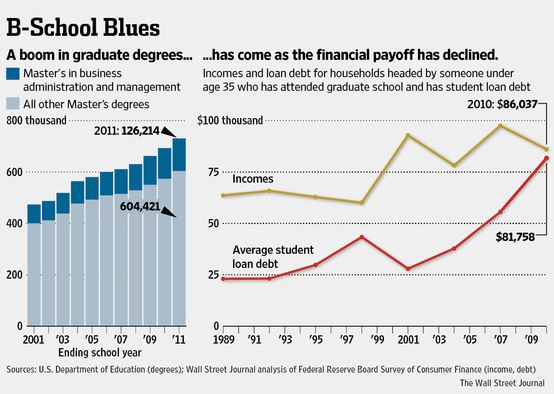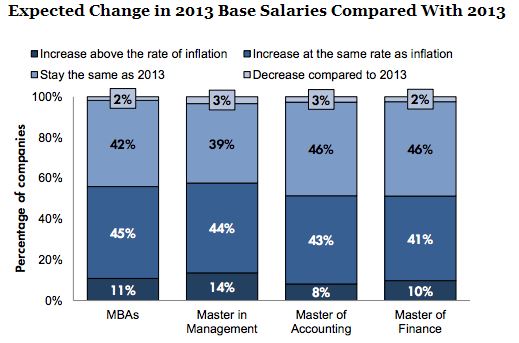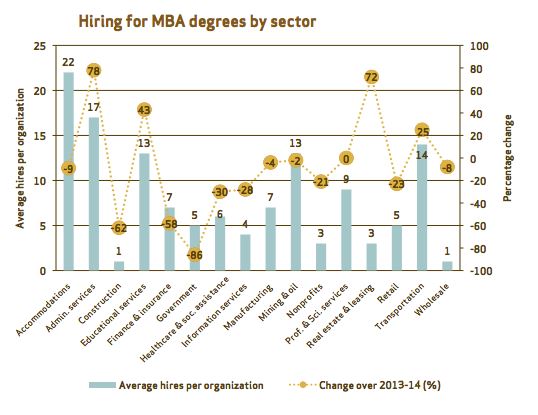Surveys show declining pay and shrinking job opportunities for business grads, even as the rest of the job market keeps healing.
We’ve all gotten used to talking about the problems with law schools and the thousands of underemployed, debt-addled JDs that they graduate. But perhaps it’s time to start taking a similarly critical look at business programs. As the Wall Street Journal illustrates in a piece today, it looks like the U.S. now has a glut of MBAs.
The problem, it seems, is the proliferation of B-grade B-schools that is in one way or other is impacting MBA prospective career outlook. Universities are now conferring 74 percent more business degrees than they did in the 2000-2001 school year. Much of that torrid growth has been driven by part-time and executive MBA programs at less-than-prestigious institutions looking to cash in. And while the supply of business grads has continued to grow, the WSJ finds that pay for young MBAs has dipped 4.6% since the recession, reflecting both the slow job market, and the fact that the degree seems to have lost some of its cache.
Meanwhile, the cost of tuition has risen 24 percent in the last three years.
As the WSJ illustrates in the graphs below, MBA programs aren’t alone in their troubles. Schools are handing out more advanced degrees than ever, and pay for grad-school alums has stagnated in turn. Part of this boils down to common sense: mediocre students who graduate from mediocre graduate programs aren’t going to suddenly find themselves working at Goldman Sachs or a tony law firm. They’re going to land the jobs they’re qualified for and drag down average pay for everyone, even if Wharton MBAs or Harvard JDs keep raking in huge paychecks.

To be clear, stalling pay doesn’t mean an MBA is now worthless–business grads still make more than your average bachelor’s holder. But it does mean the value of the diploma is eroding, especially as tuition rises. The more low-end schools that start offering online business degrees and the like, the worse we should expect the problem will become.
It’s undeniable that salaries for new MBAs have decreased since the recession, which suggests the market is glutted with business-school grads.
In a new poll reported in Businessweek, 44 percent of employers told the Council on Graduate Management Admission they wouldn’t pay more for new MBAs—and might even cut salaries for fresh business-school grads. Another 45 percent said they’ll just pay enough to keep pace with inflation. Only 65 percent of respondents were in the U.S., but it gives you a sense of tepid market for MBAs.

That’s not even worst recent news about MBA hiring.
In November, Michigan State’s Collegiate Employment Research Center projected that recruitment would tumble nearly 25 percent next near, based on a survey of hiring plans by some 6,500 employers. The center expects a whopping 58-percent decline in finance, a traditional bastion of MBA hiring. Meanwhile, the center expects hiring to improve for bachelor’s degree and Ph.D. holders.

Is this the sound of a bubble popping or a tiny market correction? We don’t know. But after a decade where MBAs grads grew by an amazing 74 percent, it’s possible we’re seeing some air being let out of a bubble.
